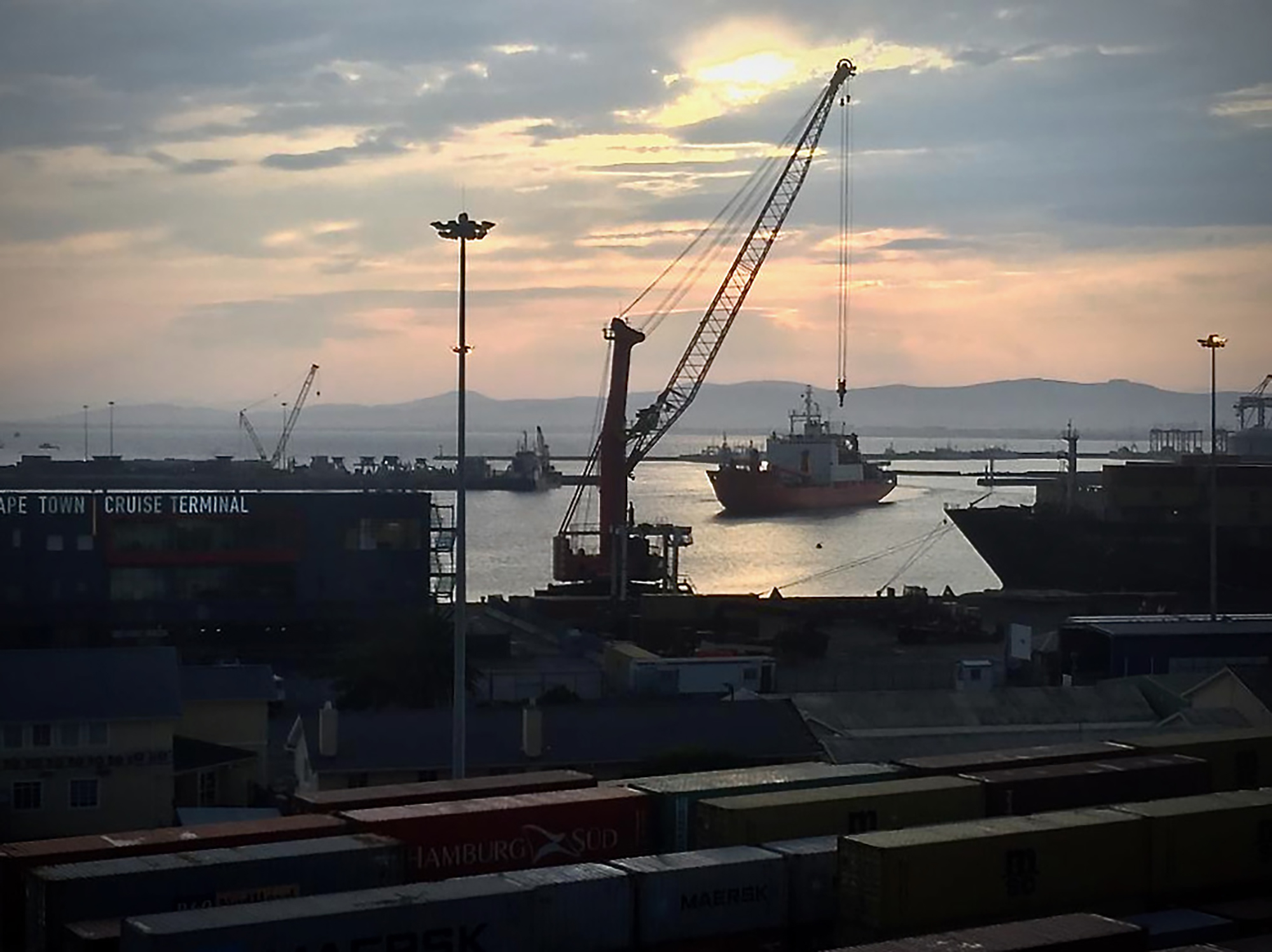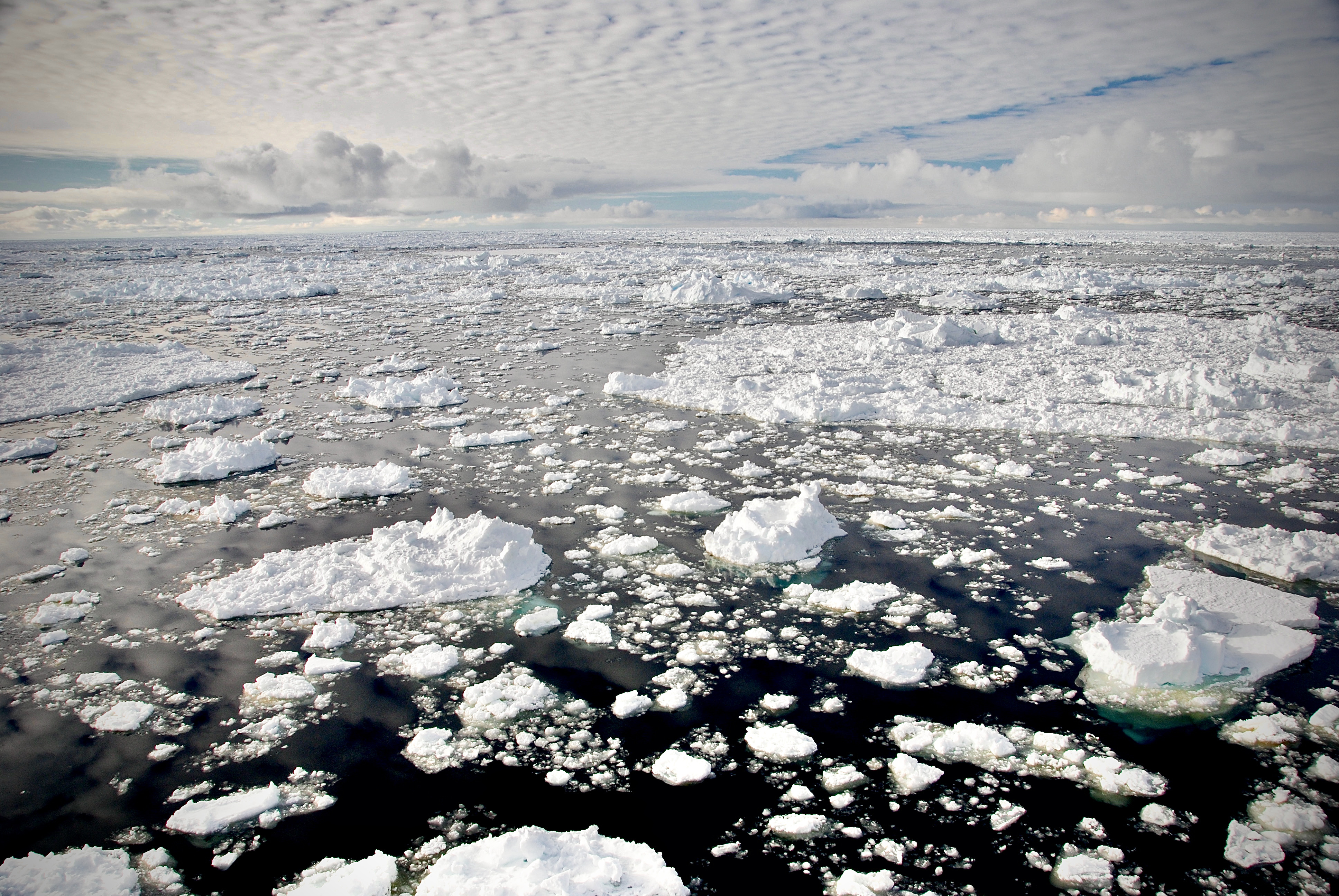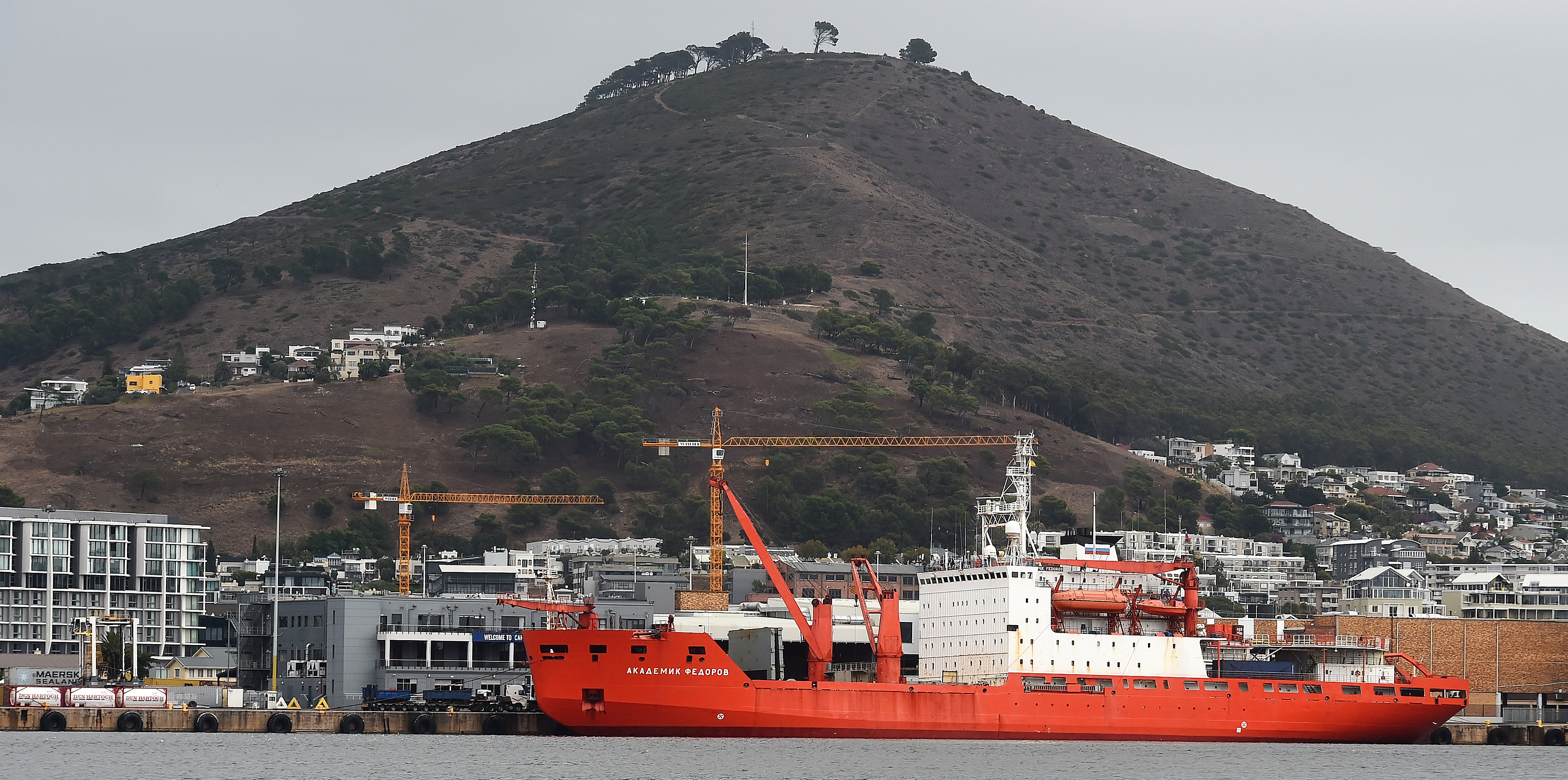Russian polar research vessel Akademik Fedorov moored in Cape Town’s Duncan Dock under cloud-laden skies at 8.12am on Wednesday morning — this, after roaming the Southern Ocean during the recent summer and autumn, that brief weather window when science outposts in hostile Antarctica can receive supplies for the harsh coming winter.
Any other year this would have been just another season of polar logistics in Africa’s most southwestern port, a long-established gateway to Antarctica for states including Ukraine — whose Noosfera polar vessel is expected in Cape Town at the end of May after wrapping her supply and research rounds.
But this year, a hard problem confronts the Antarctic Treaty’s 54 nation states, set to gather in Berlin next week for their first face-to-face annual meeting since the pandemic. Charged with governing the Antarctic as a natural reserve for peace and science, the treaty is an iconic non-violence pact often cited as a benchmark in international cooperation. Yet, in February, treaty founding signatory Russia stormed the sovereign soil of Ukraine, a fellow signatory with decision-making rights to how the world’s greatest deep freeze is governed.
Among rare global diplomatic achievements, the treaty has banned radioactive waste, nuclear tests and territorial possession for more than six decades. And it has avoided bloodshed in a still-resource-rich region — which presides over marine diversity and suggested oil, gas and other minerals — five times bigger than Australia.
Now, with the treaty’s corps due to meet in Berlin, with potential attendance by both Russia and Ukraine, some analysts have noted the Russia question heaves like the bellicose, eructing elephant seal in the room.
 The Akademik Fedorov slips into Table Bay harbour’s Duncan Dock on the morning of 18 May. (Photo: Marianne Merten)
The Akademik Fedorov slips into Table Bay harbour’s Duncan Dock on the morning of 18 May. (Photo: Marianne Merten)
The war is not being fought south of 60 degrees latitude, the Southern Ocean border encircling the ice-bound Antarctic. But how, among other diplomatic migraines, are treaty officials meant to address a landmark war by a rogue, power-crazed signatory who likes to suggest the Antarctic is its to lose?
Putin’s regime has given no intent of ripping Antarctica from fellow consultative parties who have earned hallowed decision-making rights by spending a lot of money on south polar research — these include Argentina, Chile, China, the UK, Norway, South Africa, New Zealand and Australia, as well as the US, which initiated the pact to defuse Cold War tensions. But it is Putin’s Russia that, despite the pandemic in 2020, pulled off round-the-world celebrations claiming its sailors had found Antarctica in 1820 (Western narratives dispute this). Like the US, it is also Putin’s hawkish, disruptive Russia that traditionally reserves the right to claim all of Antarctica at any time.
There was no doubt in his mind that Russia’s war, “involving one consultative party invading another”, was “the treaty’s biggest challenge in decades, involving one of its most significant actors — Russia”, said Patrick Flamm, an Antarctic politics scholar at New Zealand’s Victoria University of Wellington.
Architect of a war
The Russia question, then, is nothing if not mesmerisingly awkward. This year alone, Putin’s February 24 invasion has managed to defile almost every cornerstone that bulwarks the Antarctic Treaty System (ATS), the companion agreements governing the White Continent.
Sparking the bloodiest land battle since 1945, Putin’s regime is now the ignominious architect of a war that eclipses by an order of magnitude any other confrontations between consultative parties in the treaty’s 60-odd-year history. Its rank nuclear aggressions — such as threatening nuclear war, and temporarily seizing Chernobyl, the world’s greatest radioactive waste dump — imply it may deem the ATS as a mere gentleman’s agreement.
“It is not clear whether Russia will remain a trustworthy treaty partner in the eyes of other consultative parties in the next months and years after violating the most basic principles of international law and conduct in such an aggressive way,” said Flamm, part of a new academic push calling for a “forever ban” on mining Antarctic oil and gas.
The treaty forbids mining until at least 2048 when that law can be reviewed — although a new investigation by Daily Maverick shows Kremlin actors have not stopped sizing up Antarctica’s oil, gas and other mineral resource potential since the 1998 ban under the treaty’s Madrid Protocol entered into force.
Despite all the above — the treaty secretariat, or Germany as hosts of the upcoming Berlin meeting less than a week away — have yet to make any statement about the Putin regime’s malfeasance at all.
This is either a sign of a don’t-rock-the-icebreaker culture badly out of synch with the zeitgeist, failing to acknowledge formally the deeply felt experience of scientists serving Ukraine’s Antarctic interests; or a tacit admission that war tensions have not, and should not, disrupt treaty business.
That depends on who one speaks to.
“Antarctica this year is covered by war,” Evgen Dykyi, director of Ukraine’s Antarctic science programme, wrote on his personal Facebook page.
End March, during her maiden voyage, Ukraine’s new Noosfera research vessel would deliver 14 overwintering members and 80 tons of cargo to the country’s Vernadsky research station in West Antarctica. As removed as this conflict seemed from Far South, it would not spare Ukraine’s polar researchers the brutalities of Putin’s irascible mind.
“Six days ago, I was collecting a backpack and measuring warm clothes,” Dykyi noted early March. “I had an air ticket to Chile, where I was to climb aboard the Noosfera and lead the first Ukraine science expedition on the ocean in 20 years. On February 24, I was standing in a huge queue to repel the storming of the city, quite sceptical about my chances of surviving the night.”
Geophysicist and Kharkiv native Jan Bakhmat, member of Vernadsky’s recent overwinterers, recounted mistaking seismic activity near the disputed Kuril Islands off Japan and Russia for a nuclear attack.
It was the third day of the invasion, about 15,000km from home.
“You look and think: why is the earth shaking so much?” Bakhmat told Ukraine news site Pravda. “The worst-case scenario is already underway.”
Returning from West Antarctica this season, Polish researchers refused to board a chartered Russian vessel, braving the Drake Passage on the Noosfera instead, Dykyi said.
“In other words,” Dykyi concluded with his own coup de grâce, “the Poles also told a Russian ship to ‘go to hell’.” Polish and Ukraine Antarctic authorities could not be reached for comment.
A more discreet nod to the February “Snake Island” retort — when a Ukraine soldier told a Russian warship to “go f*** yourself” — Dykyi’s quip, nevertheless, does not exactly epitomise standard treaty discretion. But for those who note war has altered the context, some pitching and rolling is expected.
“Russian actions plainly and materially intrude on Ukraine’s capacity to conduct Antarctic operations and participate in the ATS,” said Alan Hemmings, an Antarctic governance professor at Canterbury University in New Zealand. “Given all Russia’s lying about Ukraine, one might question whether Russian statements about its Antarctic intentions now cut any ice.”
With Flamm, Hemmings has also called for a ban on mining Antarctic oil and gas.
“The politics of war have already been well and truly brought into the ATS by Russia and Belarus,” said Hemmings, flagging the latter state — a treaty signatory — for aiding the Russian invasion. Hemmings also pointed out that Ukraine’s National Antarctic Scientific Centre is domiciled in Kyiv, the missile-assailed capital. Currently inaccessible to the vessel, the assaulted city of Odesa is the Noosfera’s home port — but instead of returning to Ukraine, the vessel was “preparing for a large transit” to Cape Town where she was to “receive a second home”, according to a social media announcement by Ukraine’s Antarctic programme earlier in May.
The Cape Town transport nexus relied on by Ukraine, Russia and several other treaty states includes the Dronning Maud Land Air Network (Dromlan), which in summer flies scientists and support staff to East Antarctica’s Dronning Maud Land region.
 The Akademik Alexander Karpinsky, a Russian seismic vessel belonging to the Polar Marine Geosurvey Expedition, in Table Bay, August 2020. (Photo: Tiara Walters)
The Akademik Alexander Karpinsky, a Russian seismic vessel belonging to the Polar Marine Geosurvey Expedition, in Table Bay, August 2020. (Photo: Tiara Walters)
In New Zealand, an Antarctic gateway port, general war sanctions have already banned Russian state vessels and flights — but this is not a usual Antarctic entry point for Russia’s state science programme. So, it is Pretoria that ought to “announce closure of its ports and airports to Russian flights and vessels from the start of the 2022/23 Antarctic season”, advised Hemmings, co-author of the Handbook on the Politics of Antarctica.
This would curb prestige activities such as completing Vostok 2.0, Russia’s new inland station in the East Antarctic interior. The project is partially sponsored by war-sanctioned oligarch Leonid Mikhelson, Putin-aligned chair of independent gas producer Novatek. According to Russian media, the oligarch is sinking 4-billion roubles (about $60-million) of his own money into the build for philanthropic purposes. The Kremlin has announced its own contribution of 3.5-billion roubles (about $50-million) in transport and installation costs towards station modules, which sailed past Cape Town aboard the cargo vessel Andrey Osipov in October.
Sanctioning entry into the Southern Ocean was but one option available to consultative members who wished to signal to the Putin regime its behaviour was unacceptable. Not cancelling this year’s meeting, Hemmings added in online commentary for independent thinktank the Polar Connection, seemed “unthinkable, until it proved it was not”.
It would be inconvenient, to be sure, but the governance professor noted: “It is an inconvenience in the course of repudiating a crime.”
The 1982 Falklands/Malvinas war between Argentina and the UK, fought just north of the treaty area, is often invoked as an instance of conflict between consultative parties that did not inconvenience anyone enough to justify sanctions. But Hemmings, commander of the British Antarctic Survey station during that war, told Daily Maverick the 10-week conflict was “not a particularly good example of the present situation”.
“The warfare was not of the same scale as in Ukraine,” Hemmings wrote in his comment piece, and “it did not threaten the legitimacy, let alone the extinction of the invaded state, civilian casualties and refugees” — nor did it involve nuclear threats.
Blind to the optics
Travel restrictions might also be imposed upon Russian war ally Belarus, a treaty signatory that applied for consultative status at the 2021 online annual meeting hosted by France, Hemmings said. That submission is on the agenda at next week’s treaty meeting — if approved, Belarus would become the 30th consultative party with decision-making rights on all treaty matters governing Antarctica.
Berlin officials would have the option of “tabling an appropriate motion” to restrict gateway movements, added Jan Glazewski, professor emeritus at the University of Cape Town’s Institute of Marine & Environmental Law, and formerly chair of Cape Town’s Antarctic Gateway Project. “It would certainly send a strong signal that South Africa has changed its lukewarm reaction to the invasion,” he advised.
But apparently blind to the optics of offering itself as a mediator between Russia and Ukraine, while reportedly also hobnobbing with Russian embassy staff in the days after the invasion, Pretoria has nailed its colours to the mast — in addition to putting forward motions and casting votes that failed to condemn the war. Or impress many UN member states.
Pretoria — yet to wield its weight as the sole African representative at the treaty consultative table — may first have to plug a 2,800km coastline more porous than Swiss cheese, and the fence around its own burnt Parliament buildings, before doing something about, say, the Russians. The South African National Antarctic Programme and the Department of International Relations and Cooperation did not respond to our requests for comment.
Since 2016, Russia and China have used the treaty’s equal-vote consensus system to thwart Western-led proposals for Southern Ocean protected areas, suggesting those efforts are a territorial ruse. At this year’s meeting, China together with BRICS partners Brazil, India and South Africa will hardly upset their emerging-economy power bloc within the formerly Western-dominated ATS by ganging up against Russia. Their UN resolution votes, as a bloc largely failing to condemn Moscow, have also exposed their allegiances.
Yelena Yermakova, senior research Fellow at Japan’s Kobe Polar Cooperation Research Centre, and a Saint Petersburg native no longer based in Russia, said she worried sanctions would deepen pre-war ATS fault lines.
“Some very targeted sanctions are necessary, although I have not seen many sanctions to be very targeted,” said Yermakova, who has a special interest in global governance frameworks. “In the ideal world, these targeted sanctions would starve the Russian war machine. In the real world, they hurt regular people and create an anti-Western sentiment.”
Germany should issue a statement denouncing the war, she said, but a moral statement from the secretariat was “not feasible”: “It would require consensus from all consultative parties.” Germany’s press secretary to the upcoming meeting did not respond to our request for comment.
Urging a careful consideration of “boycott diplomacy”, she said international institutions “should contribute to developing a language of reason, especially at times like these”.
She further worried about a “very likely scenario” — “blocked and/or isolated states withdrawing and doing whatever they want in Antarctica, for instance, mining”.
The ATS could retain its credibility without doing anything, argued polar law professor Donald Rothwell.
“It has taken a very disciplined approach over the years and that is one of the reasons for its success,” said Rothwell, a specialist in Antarctic legal matters based at Australian National University in Canberra. “Great caution would be exercised in bringing the politics of the war” into the ATS, he urged.
 The Southern Ocean off the East Antarctic coast. (Photo: Tiara Walters)
The Southern Ocean off the East Antarctic coast. (Photo: Tiara Walters)
Antarctica’s most recent summer presented an endurance run of records — all-time-low sea ice, temperatures up to 40°C above normal, and shelves calving off an eastern continent once thought relatively stable. These disturbing developments demonstrate the universal significance of scientific continuity, and protecting those responsible for maintaining it: Ukraine’s Vernadsky station, previously Faraday when it belonged to the UK, has managed important climate data sets in the Antarctic since 1947.
In the recent austral summer, Russian climatologists reported lifting a 570,000-year-old ice core from subglacial lake Vostok to deep-read Earth’s ancient climate. Next year, they hope to extract samples “more than 1 million years old”.
With science such as this at stake, Hemmings alluded to the costs of giving free rein to eructing elephant seals — which, in Europe or the Antarctic, is what business as usual seems to afford Putin’s regime.
To paraphrase the Apollo 14 astronaut Edgar D. Mitchell, it is tempting to grab this politician by the scruff of his neck, drag him up to the moon for a privileged view of the pale blue dot and say, “Look at that, you son of a b****.” But that may only give Putin ideas.
“Much of the research that underpins the future of our entire planet comes out of the Antarctic. Yet we are totally incapable of having a discussion around the treaty table about these things,” added Hemmings, a long-time meeting observer. He stressed not “demonising individual Russians, who are as hostage to their government as anybody else”.
 The Akademik Fedorov’s position in Cape Town’s Duncan dock at the time of publication. (Source: Marinetraffic.com)
The Akademik Fedorov’s position in Cape Town’s Duncan dock at the time of publication. (Source: Marinetraffic.com)
Some of these Russian scientists have likely risked their careers, and more, to excoriate Putin on social media.
On the day his Vernadsky counterpart imagined a Russian nuclear onslaught, Vostok glaciologist Alexey Ekaykin wrote on his personal Facebook page, then public, that Putin’s war had “driven itself into a zugzwang — any move will lead to a worse situation”. Ekaykin has also produced numerous anti-war posts on VK, the Russian social networking site.
The first clause of the treaty constitution insists Antarctica “shall not become the scene or object of international discord”. It is this diplomatic understanding that this month is set to give safe harbour to both Ukraine’s Noosfera and Russia’s Fedorov. The Fedorov’s Antarctic sister vessel, the Akademik Tryoshnikov, also called at Table Bay in March after wrapping her own Southern Ocean season, finally arriving back at her Saint Petersburg home port in mid-April.
But it may be too late to avoid the scenes the treaty constitution warns against.
“The times of business as usual are over — many options and possible futures are currently on the table to keep the Antarctic a natural reserve, devoted to peace and science,” said Flamm, the polar politics specialist. “The decisions taken now, at this critical juncture, will shape the future of Antarctic governance for a long time to come.”
It was unclear at the time of publication whether Russian, Belarusian and Ukrainian authorities would attend the treaty’s annual meeting in Berlin. Authorities from those countries and the treaty secretariat did not respond to our requests for comment.
Daily Maverick’s multiple requests to attend the 2021 Paris and 2022 Berlin two-week annual meetings were denied by both the French and German governments, which noted only the opening ceremony would be accessible to the press. DM/OBP
Read our current and previous stories in this investigation here and here.
Join us for a live discussion with Tiara Walters on the latest investigation of Russia’s power push into Antarctica. Register here.




 The Akademik Fedorov’s position in Cape Town’s Duncan dock at the time of publication. Source: Marinetraffic.com
The Akademik Fedorov’s position in Cape Town’s Duncan dock at the time of publication. Source: Marinetraffic.com 